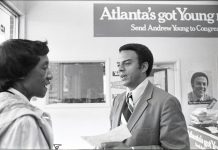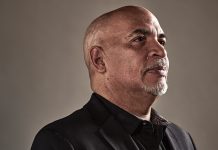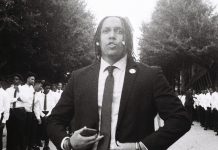
Photograph courtesy of Auburn Avenue Research Library on African American Culture and History, Fulton County Library System
As the civil rights movement unfolded in Atlanta, leaders and organizers came to the table, quite literally, in a coterie of Black-owned restaurants. Akila Sankar McConnell, author of A Culinary History of Atlanta, host of the Savory Stories podcast on WABE, and owner of Unexpected Atlanta Tours, puts it this way: “Atlanta’s restaurateurs fed and funded the civil rights movement. As it was a grassroots movement with limited funding, restaurateurs like James and Robert Paschal and Lucy Jackson [of Busy Bee] graciously gave their food and space for meetings. The major civil rights movement decisions, from the March on Washington to the Poor People’s Campaign, were made at the tables of Atlanta’s historic Black-owned restaurants. The generosity and unwavering support of these restaurateurs helped make the work of the civil rights movement possible.”
The most lauded haven was Paschal’s Restaurant. At its location on Hunter Street (renamed Martin Luther King Jr. Drive in 1976), it was also a hotel and home to renowned jazz club La Carrousel. According to A Culinary History of Atlanta, King came to the Paschal brothers and asked for a place where he and fellow activists could “eat, meet, rest, plan, and strategize.” The Paschal brothers felt called to action. Among the frequent diners joining King were John Lewis, Julian Bond, and Jesse Jackson. During the 1960s, the brothers posted bond for arrested protesters and served meals to waiting family and friends. Today, a newer Paschal’s Restaurant operates on Northside Drive and still serves its famous 1947 Fried Chicken, a favorite of King’s, who ordered it with candied yams and collards.
Next door to Paschal’s is the beloved Busy Bee Cafe, opened by self-taught cook Lucy Jackson, aka “Mama Lucy.” It has remained a must-stop for many, including Presidents Obama and Biden. The restaurant’s fried chicken has legions of fans, as do its fried okra, mac and cheese, and banana pudding. Its reputation for consistent quality and Southern hospitality has earned it a James Beard Award and Michelin’s Bib Gourmand honor. The small dining room has been closed since the pandemic began, but business remains brisk with online ordering and curbside service.
Across the street from Busy Bee Cafe was Aleck’s Barbecue Heaven. Former Atlanta mayor Andrew Young, quoted in a 2016 article by Jim Shahin in The Washington Post, recalled, “Aleck’s was probably as responsible as much as anything for Martin Luther King’s greatest speeches. Whenever he had to write a speech, he’d either get some ribs or have somebody get some for him and take them to his house. ‘You can’t stop eating them, and then you can’t go to sleep,’ he said. He’d stay up all night and read and write because of those ribs.” Founded by Ernest Alexander in 1942, Aleck’s was a tiny place that offered smoked meats and a famous Come Back sauce. The late-night hangout, also popular with journalists, is long gone; a Walmart parking lot covers its sacred place.
Frazier’s Cafe Society sat down the road from Busy Bee and created a stir by encouraging Black and White folks to dine together. Evelyn Jones Frazier played by her own rules when it came to the menu and the integration of guests. Her elegant table settings and sophisticated manner, not to mention her signature Icebox Lemon Pie, elevated the conversations, which leaned toward revolution and community service.
B.B. Beamon’s 24-hour restaurant was a beacon at the corner of Butler Street (now Jesse Hill Jr. Drive) and Auburn Avenue. The sparkling diner attracted Black entertainers as well as activists and served as a touchstone for nearby residents. Its private dining room offered organizers a place to hole up; desserts lured postshow performers; and Sundays brought in hungry churchgoers, newly redeemed and ready for supper.













